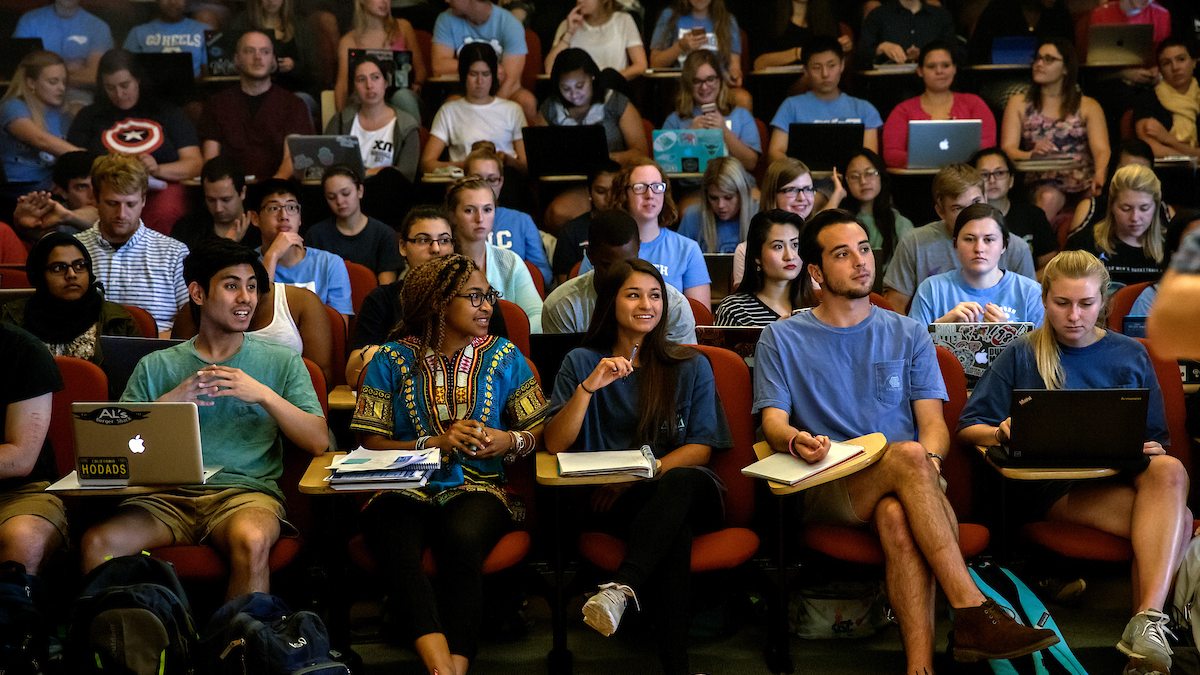New Ideas, Information and Inquiry courses explore broad topics across disciplines
The College of Arts & Sciences will offer five new courses in the spring to pilot-test a new core offering being proposed for the general education curriculum.

First-year and transfer students can sign up for five new pilot courses in spring 2019 that address broad topics and are team-taught by outstanding faculty members across three different disciplines.
These large, interdisciplinary courses cover broad themes such as “happiness and well-being” and are designed to introduce students to four key capacities that they will develop in future study: data literacy, global orientation, principles of evidence and collaboration. The courses offer students a unique chance to explore the ways in which Carolina’s top scholars and teachers investigate big questions and ideas.
All five courses are “Ideas, Information and Inquiry” courses, nicknamed “III” or “Triple-I” for short. If the pilot phase is successful, III is under consideration to become a core requirement for first-year and transfer students under the new general education curriculum, currently called IDEAs in Action and still being developed. (IDEA is an acronym for Identify, Discover, Evaluate and Act.)
“I’m excited by the potential of these courses and what we hope students will get out of them —discovering how faculty will approach the same topic from different perspectives according to their research expertise, and the richness and complexity of insight this opportunity provides for the students,” said Kevin Guskiewicz, dean of the College of Arts & Sciences. “It perfectly embodies the College’s tagline, Synergy Unleashed, and highlights our unique strengths.”
Registration will begin in early November. Triple I courses are found under the code “IDST.”
The courses and their faculty members are:
- Philosophy, Politics and Economics: This course provides an overview of core conceptual tools used to analyze issues at the intersection of philosophy, politics and economics (PPE). This collection of tools, which are often employed in isolation, gain considerable power when they are brought together. Faculty: Luc Bovens (philosophy), Douglas MacKay (public policy) and Brian McManus (economics).
- Death and Dying: Death and dying are universal experiences, yet there is immense cultural variation and historical fluidity in the ways we define, understand and treat death, dying and the relations between the living and the dead. Faculty: Jeannie Loeb (psychology and neuroscience), Jocelyn Chua (anthropology) and Tim Marr (American studies).
- The Idea of Race: Students will learn why race is not a viable human biological concept, how the idea of race arose historically and what alternative concepts exist for understanding human diversity and change over time. Faculty: David Pier (African, African American and diaspora studies), J. Michael Terry (linguistics) and Daniel Matute (biology).
- The Environment, Intersectionality and Science Fiction: How has the genre of science fiction (film and literature) been used to address the world’s environmental concerns, and how do these concerns affect characters differently depending on their gender, race and class? Faculty: Pricilla Layne (Germanic and Slavic languages and literatures), Courtney Woods (environmental sciences and engineering) and Michele Berger (women’s and gender studies).
- Happiness and Well-Being: Students will be exposed to the ideas of happiness and well-being from the disciplines of physiology, positive psychology and sociology. They will also be taught important life skills such as cultivating teamwork, developing social connections, being physically active and more. Faculty: Arne Kalleberg (sociology), Barbara Fredrickson (psychology and neuroscience) and Claudio Battaglini (exercise and sport science).
Read more about the new courses at the Office of Undergraduate Curricula website.




